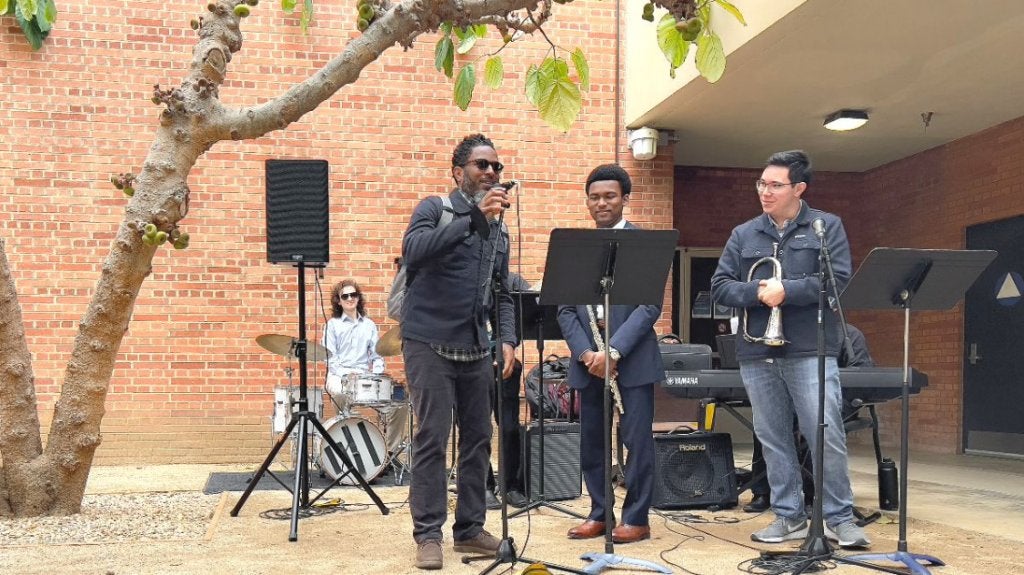The Herb Alpert School of Music has designated an outdoor space between the Music Library at the Schoenberg Musical Building and the recording center in the Ostin Music Center as a haven from discrimination and marginalization. The dedication ceremony, which was attended by The Herb Alpert School of Music community and their guests, took place on Thursday, March 31 and featured music, spoken word, dance, and refreshments.
The dedication ceremony, much like the haven itself, was inspired by students of the school of music. The ceremony began with a dedication of the grounds, honoring of the Gabrielino/Tongva peoples, the traditional land caretakers of the Los Angeles basin. After an address by Eileen Strempel, the inaugural dean of the school of music, and Arturo O’Farrill, associate dean for equity, diversity and inclusion, the audience witnessed the performance of the world premiere of a musical composition that was written expressly for the ceremony by Dexter Story, doctoral candidate in Ethnomusicology. Students, faculty, and staff were then invited to share offerings of their own, whether musical or spoken word, dance or other creative gesture.
“We are delighted to open this new space,” said Arturo O’Farrill. “We are especially honored to have staff, faculty, and students participate in the dedication ceremony by sharing their art with the community.”
The formal name for the courtyard space will be chosen by the students, after consultation with undergraduate and graduate student leadership.
The idea for an outdoor space dedicated to anti-racism stemmed from a report issued by The Herb Alpert School of Music’s Committee for Anti-Racism and Anti-Discrimination (ARAD). The committee was co-chaired by a student, two staff, and one faculty member, and was assembled as a non-appointed, non-hierarchical body in July 2020. The committee presented its report and recommendations earlier this year.
Among those recommendations was the creation of an outdoor haven that would serve as an area of repose, reflection, and communal activity, free of predatory bias. Designed to be a welcoming space, it is shaded and peaceful, and has been enhanced with appropriate signage, tables, chairs, and electrical outlets. The space also features information about how to report instances of racism, bias, and marginalization, and is intended as a space for students to hold informal sessions discussing issues of equity and inclusion.
ARAD’s report identified three major areas of concentration for the School of Music to address: the culture of violence targeting minority communities; the culture of academia; and the overall community, connections, and communication within The Herb Alpert School of Music. Each of these areas contained recommended actions, including expanding the mentoring program to connect BIPOC students with BIPOC alumni, establishing monthly forums/listening sessions with students to support mental and emotional health, and communicating more intentionally the resources that are available for students.
Importantly, ARAD noted, The Herb Alpert School of Music should make certain that all faculty, students and staff are aware of the process for reporting incidents of racism and discrimination, which can be done either by visiting https://equity.ucla.edu/report-an-incident or by calling the 24-hour EDI phone number (310) 825-3935.
“The report is just the beginning,” said associate dean O’Farrill. “The key will be following up and checking on the school’s progress in creating a welcoming community.” Dedicating the outdoor haven is a step in that direction.
